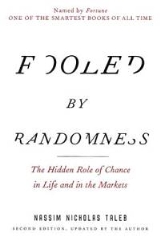
Fooled by Randomness
Encyclopedia
Fooled by Randomness: The Hidden Role of Chance in Life and in the Markets is a book written by Nassim Nicholas Taleb about the fallibility of human knowledge.
as one of the 75 "Smartest Books of All Time."
The book's name, Fooled by Randomness, has also become an idiom in English used to describe when someone sees a pattern where there is just random noise.
. They tend to explain random outcomes as non-random.
Human beings:
Other misperceptions of randomness
that are discussed include:
Reaction
The book was selected by FortuneFortune (magazine)
Fortune is a global business magazine published by Time Inc. Founded by Henry Luce in 1930, the publishing business, consisting of Time, Life, Fortune, and Sports Illustrated, grew to become Time Warner. In turn, AOL grew as it acquired Time Warner in 2000 when Time Warner was the world's largest...
as one of the 75 "Smartest Books of All Time."
The book's name, Fooled by Randomness, has also become an idiom in English used to describe when someone sees a pattern where there is just random noise.
Thesis
Taleb sets forth the idea that modern humans are often unaware of the existence of randomnessRandomness
Randomness has somewhat differing meanings as used in various fields. It also has common meanings which are connected to the notion of predictability of events....
. They tend to explain random outcomes as non-random.
Human beings:
- overestimate causalityCausalityCausality is the relationship between an event and a second event , where the second event is understood as a consequence of the first....
, e.g., they see elephants in the clouds instead of understanding that they are in fact randomly shaped clouds that appear to our eyes as elephants (or something else); - tend to view the world as more explainableExplanationAn explanation is a set of statements constructed to describe a set of facts which clarifies the causes, context, and consequencesof those facts....
than it really is. So they look for explanations even when there are none.
Other misperceptions of randomness
Randomness
Randomness has somewhat differing meanings as used in various fields. It also has common meanings which are connected to the notion of predictability of events....
that are discussed include:
- Survivorship biasSurvivorship biasSurvivorship bias is the logical error of concentrating on the people or things that "survived" some process and inadvertently overlooking those that didn't because of their lack of visibility. This can lead to false conclusions in several different ways...
. We see the winners and try to "learn" from them, while forgetting the huge number of losers. - Skewed distributions. Many real life phenomena are not 50:50 bets like tossing a coin, but have various unusual and counter-intuitive distributionsBenford's lawBenford's law, also called the first-digit law, states that in lists of numbers from many real-life sources of data, the leading digit is distributed in a specific, non-uniform way...
. An example of this is a 99:1 bet in which you almost always win, but when you lose, you lose all your savings. People can easily be fooled by statements like "I won this bet 50 times". According to Taleb: "Option sellers, it is said, eat like chickens and go to the bathroom like elephants", which is to say, option sellers may earn a steady small income from selling the options, but when a disaster happens they lose a fortune.
Editions
- In 2001, TEXERE published the first edition of the book. (ISBN 1-58799-071-7, London : Texere, 2001)
- In 2004, TEXERE published a revamped second edition.
- In 2005, Random HouseRandom HouseRandom House, Inc. is the largest general-interest trade book publisher in the world. It has been owned since 1998 by the German private media corporation Bertelsmann and has become the umbrella brand for Bertelsmann book publishing. Random House also has a movie production arm, Random House Films,...
published a softback edition with more changes. (ISBN ISBN 1-58799-190-X, New York : Random house, 2005) - In 2005, a French version appeared, with many unique changes.
- The book has been translated into 20 languages, and is reported to have sold over half a million copies.
- Further editions have been published by Penguin (softback, May 2007) and Random House (hardback, October 2008.)
See also
- List of cognitive biases
- Ludic fallacyLudic fallacyThe ludic fallacy is a term coined by Nassim Nicholas Taleb in his 2007 book The Black Swan. "Ludic" is from the Latin ludus, meaning "play, game, sport, pastime." It is summarized as "the misuse of games to model real-life situations." Taleb explains the fallacy as "basing studies of chance on the...
- PareidoliaPareidoliaPareidolia is a psychological phenomenon involving a vague and random stimulus being perceived as significant. Common examples include seeing images of animals or faces in clouds, the man in the moon or the Moon rabbit, and hearing hidden messages on records played in reverse...
- the psychological phenomenon of perceiving pattern in randomness
External links
- Nassim Taleb's home page — scroll down there to see a description of the book as well as many media reviews

